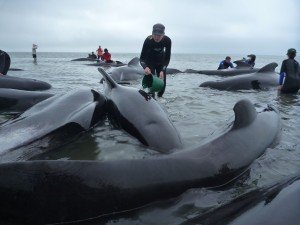A new study questions the hypothesis that mass whale strandings are the result of family members coming to the aid of their beached kin.

Researchers from New Zealand, the US and Australia used genetic data to investigate family links between almost 500 long-finned pilot whales involved in a number of mass strandings in New Zealand and Tasmania.
The research was published today in the Journal of Heredity.
The authors found that stranded groups are not necessarily members of one extended family, evidence that contradicts the hypothesis that stranding groups all descend from a single ancestral mother. Further, many stranded calves were found with no mother in evidence.
“If kinship-based social dynamics were playing a critical role in these pilot whale strandings, first, we would expect to find that the individuals in a stranding event are, in fact, all related to each other,” explained lead author Marc Oremus of the University of Auckland.
The results of this study have important implications for rescue efforts aimed at “refloating” stranded whales. “Often, stranded calves are refloated with the nearest mature females, under the assumption that this is the mother,” explained co-author Scott Baker from Oregon State University.
“Well-intentioned rescuers hope that refloating a mother and calf together will prevent re-stranding. Unfortunately, the nearest female might not be the mother of the calf. Our results caution against making rescue decisions based only on this assumption.”
You can listen to a Radio NZ interview with Prof Baker below.
Further media coverage:
ABC Science News: Family link unlikely in whale stranding: study
TVNZ News: Whale beachings no family affair – study
Newstalk ZB: New research gives insight into beached whales
Stuff.co.nz: Whale beachings no family affair – study
You can find more information on whale strandings in New Zealand at ProjectJonah.org.nz.
The Journal of Heredity has highlighted the open access article with the banner below.
